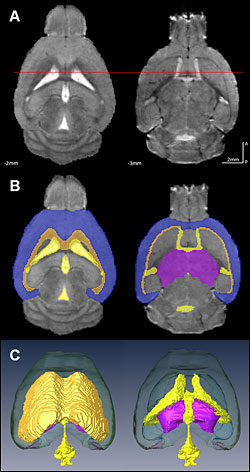Published: February 16, 2012

The scientists used MRI data mapped onto an existing atlas of the mouse brain to compare the effects of drinking ethanol and water on brain volume overall and region-by-region in mice with and without dopamine D2 receptors. Alcohol-drinking mice that lacked dopamine receptors had lower overall brain volume and reduced volume in the cerebral cortex (blue) and thalamus (purple) compared with D2 receptor-deficient mice drinking water. Alcohol-drinking mice with dopamine receptors did not show these deficits in response to drinking alcohol, suggesting that dopamine receptors may be protective against the brain atrophy associated with chronic drinking.
rain scans of two strains of mice imbibing significant quantities of alcohol reveal serious shrinkage in some brain regions — but only in mice lacking a particular type of receptor for dopamine, the brain’s “reward” chemical – but only in mice lacking a particular type of receptor for dopamine, the brain’s “reward” chemical. The study, conducted at the U.S. Department of Energy’s Brookhaven National Laboratory and published in the May 2012 issue of Alcoholism: Clinical and Experimental Research, now online, provides new evidence that these dopamine receptors, known as DRD2, may play a protective role against alcohol-induced brain damage.
[continue reading…]
Published: February 3, 2012
 Today’s Guardian reports that tweeting or checking emails may be harder to resist than cigarettes and alcohol, according to researchers who tried to measure how well people could resist their desires.
Today’s Guardian reports that tweeting or checking emails may be harder to resist than cigarettes and alcohol, according to researchers who tried to measure how well people could resist their desires.
They even claim that while sleep and sex may be stronger urges, people are more likely to give in to longings or cravings to use social and other media.They even claim that while sleep and sex may be stronger urges, people are more likely to give in to longings or cravings to use social and other media.
A team headed by Wilhelm Hofmann of Chicago University’s Booth Business School say their experiment, using BlackBerrys, to gauge the willpower of 205 people aged between 18 and 85 in and around the German city of Würtzburg is the first to monitor such responses “in the wild” outside a laboratory.
The results will soon be published in the journal Psychological Science. Read the full story in The Guardian
Published: October 9, 2011

Medicines which increase levels of the brain chemical dopamine may hold the key to helping those addicted to cocaine and amphetamines kick the habit, researchers from the University of Cambridge have found.
Unlike heroin users who may benefit from methadone when attempting to quit, there is currently no medication which has proven to be an effective tool in assisting cocaine and amphetamines users when attempting to quit.
“Treatment for stimulant dependence is difficult and often individuals battling addiction relapse several times,” said Dr Karen Ersche, of the Behavioural and Clinical Neuroscience Institute (BCNI) at the University of Cambridge, who led the research.
“At the moment, the standard treatment for people dependent on cocaine and amphetamines mainly involves behavioural approaches such as counselling and cognitive-behavioural therapy – which are useful. However, our research provides important insight into the potential development of medications which could help curb the desire of those plagued with addiction, increasing the likelihood of a successful recovery.”
For the research, Dr Ersche and her Cambridge colleagues asked stimulant-dependent individuals and volunteers who do not use drugs to perform a learning task while their brains were scanned. They found that stimulant-dependent people had problems with adjusting their behaviour when one of the rules was changed – they persistently responded to the previously correct stimulus despite being repeatedly told that the rule had changed and their responses were wrong. [continue reading…]
Published: October 8, 2011
 Can parachuting help people with a gambling addiction? New research shows that extreme sport athletes have quite a lot in common with gamblers.
Can parachuting help people with a gambling addiction? New research shows that extreme sport athletes have quite a lot in common with gamblers.
The money-hustling schemes of the racecourse and parachuting may seem like worlds apart. But according to new research from the University of Bergen (UiB), extreme sport athletes may be just as addicted to thrill-seeking and their impulses as compulsive gamblers are. [continue reading…]




